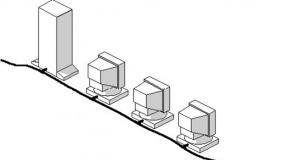The meaning of the word iteration. Why iterations are needed
An iteration is a set period of time within a project during which a stable working version of the product is produced. It comes with installation scripts, accompanying documentation, and other artifacts that are necessary to use this release.
Brief information
A working version of the product allows you to show stakeholders the actual development of the project. During the demonstration, the development team can get feedback on what needs to be done to gain a broader understanding of the needs and how to implement them. The next iteration is based on the previous one. The resulting product is one stage closer to the final one. An iteration is a limited period. In other words, the schedule is quite rigidly fixed. In order to meet this schedule, the content of the time period may change.
Peculiarities
An iteration is a clearly regulated period. Project development has carefully planned goals, and the duration of the time period itself is fixed. When regulating, each iteration sets its own evaluation criteria. At the same time, responsibilities and tasks are clearly distributed among the participants involved in the project. Additionally, a study of objective indicators of project development is carried out. An iteration is a period involving a certain number of rework. It should be said that they are all carried out in a structured way.

Integration
Any simple iteration must consider the likely risks that are important to the project and also implement high-priority components of the work. The result is confidence that each period adds maximum value to stakeholders while reducing uncertainty. Typically, iterative development is combined with continuous or frequent integration. In other words, once the components pass the unit tests, they are integrated into the overall project. Afterwards assembly and testing are carried out. Thus, the capabilities of integrated products increase throughout the iteration relative to the goals that were determined during planning. Regular builds (daily or more frequent) allow you to separate the problems and tasks of integration and testing and distribute them evenly throughout the entire development cycle. Often the reason projects fail is that all the difficulties are discovered at one point in one event at the final stage. In this case, because of a single problem, the entire team stops.

Prospects
Due to the complexity of the technology used today software It is not always possible to consistently design, define requirements, test, implement, select an architecture, and perform these and other stages correctly. The iterative solution allows, at the end of each period, to give interested parties access to the project's capabilities. In this case, the team receives feedback quickly and periodically during development. They, in turn, allow improvements to be made and problems to be solved more cost-effectively if they are within the project's time and budget and long before development has progressed far enough that significant modifications may be required. Iteration allows you to get valid code. It can be activated, evaluated and adjusted in the direction of project development. Typically the period lasts four weeks. However, there are teams that work for seven days or longer - up to a month and a half.
Iteration(lat. iteratio- repetition) - in mathematics, One of a series of repetitions of a mathematical operation, using the result of a previous similar operation. example: Factorial(!) - N! = 1 x 2 x 3 x ... x (N-1) x N, where N is any integer; Each successive multiplication is called an iteration.
Being essentially nonlinear computational processes, iterations in areas of instability and bifurcation “forks” exactly reproduce the chaotization of behavior according to the Ferhulst-Feigenbaum scenario, inherent in nonlinear processes of a wide variety of physical, chemical, biological and even social natures. See, for example: Peitgen H.-O., Richter P. H. The beauty of fractals. - M.: Mir, 1993.
Iteration in programming
Iteration is an organization of data processing in which actions are repeated many times without causing calls to themselves.
When an action needs to be repeated a large number of times, programming uses loops. For example, you need to display the text “Hello, World!” 200 times. " Instead of repeating the same text output command 200 times, a loop is often created that loops 200 times, and does what is written in the body of the loop 200 times. One step of the cycle is called iteration.
be:IterationsRepetition, cycle Dictionary of Russian synonyms. iteration noun, number of synonyms: 2 operation (457) ... Synonym dictionary
iteration- — [] iteration Repeated application of a mathematical operation (with changed data) when solving computational problems to gradually approach the desired result (this can be seen in ... ... Technical Translator's Guide
The repeated application of a mathematical operation in a series of similar operations performed to obtain a result. Dictionary of business terms. Akademik.ru. 2001 ... Dictionary of business terms
- (from Latin iteratio repetition) repeated application of any mathematical operation ... Big Encyclopedic Dictionary
Iteration- (iteration): more than one-time use of a component for various operations... Source: INFORMATION TECHNOLOGY. METHODS AND MEANS OF ENSURING SAFETY. CRITERIA FOR ASSESSING THE SECURITY OF INFORMATION TECHNOLOGIES. PART 1.… … Official terminology
iteration- and, f. iteration f. lat. iterare repeat, renew. mat. The result of using what n. mathematical operation resulting from a series of similar operations. Krysin 1998. Iterated aya, oe. Repeated. Sauer. Lex. SIS 1954: iteration… Historical Dictionary of Gallicisms of the Russian Language
Iteration- repeated application of a mathematical operation (with changed data) when solving computational problems to gradually approach the desired result (this can be seen in the block diagram for calculating the arithmetic mean, see Fig. A.2 to the article... Economic and mathematical dictionary
- (lat. iteratio repetition) mat. the result of using what l. mathematical operation resulting from a series of similar operations. New dictionary of foreign words. by EdwART, 2009. iteration [Dictionary of foreign words of the Russian language
- (from Latin iteratio repetition), repeated application of any mathematical operation. * * * ITERATION ITERATION (from the Latin iteratio repetition), repeated application of any mathematical operation... encyclopedic Dictionary
iteration- iteracija statusas T sritis automatika atitikmenys: engl. iteration vok. Iteration, f rus. iteration, f pranc. itération, f … Automatikos terminų žodynas
Books
- Agile testing. A Practical Guide for Software Testers and Agile Teams, Crispin Lisa, Gregory Janet. Testing is a key component of agile development. The widespread adoption of agile methods has led to the need to place effective testing techniques in the spotlight, and agile...
- Normal families of analytic functions. , Montel P.. Normal families... belong to the pen of the famous French mathematician P. Montel and are a monograph on the theory of normal families, the creator of which is P. Montel, and ...
A word, action, mathematical symbol or hieroglyph is repeated many times. The step in the program cycle turns and turns. And sometimes even a bet on horse racing is repeated.
All these different things are called in one word"iteration", which comes from the Latin word iteratio, which translates as “I repeat.” This word is used in completely different areas:
- in mathematics, meaning the repetition of a particular mathematical operation or sign.
- in hieroglyphics, meaning the doubling of one character or syllable.
- in programming, where iteration can be either a general set of operations or one step in a loop.
- in psychology, iteration means pathological repetition of an action in severe illnesses.
- also iteration can be a winning strategy in game theory.
Iteration in mathematics and programming
Thanks to various jokes and educational images, iteration's sister, recursion, is much more familiar to people. Recursion is the repetition of an object or process within itself, where it causes or repeats itself within itself again and again. Iteration in this sense much easier, because when repeated, it in no way enters into itself and does not refer to its own structure.
In mathematics, iteration is known not only as the simple repetition of a symbol or operation, but also as a technique for solving mathematical problems and equations. There is a whole large list of methods for solving systems of linear algebraic equations, and this entire list is iterative. To put it simply, this the method reduces to re-solving the equation, each time finding an approximate result, but closer and closer to the correct one.
In programming, iteration is quite ambiguous. On a large scale, it can mean the entire project management structure. In a sense, this is no longer programming, but management and organization of the work process.
In this case, iteration can be considered as a complete pass through all operations and elements that leads to the release of a product. Each individual case of such an iteration pass in a large project ends compiling– assembly of the final product – testing and return to development.
On a smaller scale of programming, iteration is again the sister of recursion. When it is necessary to repeatedly enter or output any data, or repeat the same operation, a loop is used in the body of the program. One step of such a cycle, one execution of given commands, will be an iteration.
Iteration in psychiatry
With severe disorders or damage to the brain, a person may perform some actions pathologically and uncontrollably, for example, moving repeatedly and rhythmically, repeating a word or part of a phrase, or reproducing a gesture or pose. This repetition of actions is called iteration, and in some ways it is close to tic disorders.
A similar obsessive state occurs with various painful conditions: schizophrenia, severe autism or dementia, when recovering from post-traumatic coma, dementia, some forms of clinical depression and many, many other brain diseases.
Iteration in psychiatry is most often tied to itself, it is a repetition of the actions of the patient himself, but sometimes the patient begins to reproduce and repeat the words, gestures and poses of the people around him. This tic disorder is in turn called echopraxia, which is Latin for “repetition of action.” A separate repetition of words is called echolalia - “repetition of words.”
Iteration in linguistics
In Japanese, iteration sounds much more beautiful - odoriji. Odoriji is the repetition of a character or one syllable. Or, on the contrary, avoiding repetition of the same hieroglyph, which is usually labor-intensive to draw. This technique has many meanings and uses; sometimes a word can even completely change its meaning after doubling the hieroglyph.
However, usually in Chinese, Japanese and Thai languages, a similar iteration of the character means simple value amplification, emphasizing the meaning, simply creating a plural or voicing a syllable when pronouncing it. Iteration was also found in the hieroglyphic writing of Ancient Egypt, where it was a separate symbol indicating a repetition of the previous hieroglyph.
Iteration in game theory
At normal system games with bets exist different strategies, leading to the player's profit, and iteration is probably the simplest of these strategies.
Typically, iteration in this case is the repetition of a bet, taking into account the experience of previous bets: doubling the amount if you lose or maintaining the bet amount if you win.
iteration (iteratio; lat. repetition) in psychiatry
pathological agitation, characterized by a tendency to repeat the same movement or complex motor act, word, part of a phrase, etc., without noticeable emotional overtones of the actions performed.
Encyclopedic Dictionary, 1998
iteration
ITERATION (from Latin iteratio - repetition) repeated application of any mathematical operation.
Iteration
(from Latin iteratio ≈ repetition) in mathematics, the result of repeated application of any mathematical operation. So, if y = f (x) º f1(x) is some function of x, then the functions f2(x) = f, f3(x) = f,..., fn (x) = f are called the second, respectively, the third,..., nth iterations of the function f (x). For example, putting f (x) = xa, we get, ┘, .
The index n is called the index, and the transition from the function f (x) to the functions f2(x), f3(x),... ≈ iteration. For some classes of functions it is possible to define an index with an arbitrary real and even complex exponent. I. are used to solve various kinds of equations and systems of equations using iterative methods. For more details, see Successive approximation method.
Lit.: Kollatz L., Functional analysis and computational mathematics, trans. from German, M., 1969.
Wikipedia
Iteration (programming)
Iteration in programming, an organization of data processing in which actions are repeated many times without leading to calls to themselves (unlike recursion).
When some action needs to be repeated a large number of times, loops are used in programming. For example, you need to display the text “Hello, World!” 200 times. " Instead of repeating the same text output command 200 times, a loop is often created that repeats 200 times and executes what is written in the body of the loop 200 times. One step of the cycle is called iteration.
Iteration (values)
Iteration- repetition of an action.
- Iteration in programming is an organization of data processing in which actions are repeated many times without causing calls to themselves.
- Iteration in psychiatry is a pathological arousal characterized by rhythmic repetition of a motor act, word or part of a phrase, observed in catatonic syndromes, postencephalitic states, especially with striatal hyperkinesis, with profound dementia, epileptic twilight states, in the process of reverse development of a comatose state of post-traumatic or intoxication genesis.
- Iteration in mathematics is the repeated application of a mathematical operation.
- Iteration in Japanese writing is a sign for doubling a character.
- Iteration - a cycle, the iteration step (or 1st, 2nd, iteration) can be considered one step of the cycle
Examples of the use of the word iteration in literature.
If the concept of the current element is not provided by the iterator, but by the container itself, iteration is forced on the container in the same way that communication fields are forced on objects from the container.
But now iteration turns into a recursion, which can greatly slow down the execution of the program, unless the translator is able to convert the recursion back into iteration.
So it’s difficult to manage two at the same time iterations for one container, but memory and time costs with such an organization iterations close to optimal.
For him, dependence on the implementation that supplies the subjects iterations objects are determined at the time of initialization and can change during program execution.
This causes the following to execute iterations current cycle, which again displays the submenu.
On each iterations cycle, the current time is checked against the assigned time passed from the command line.
In all likelihood, the way we perceive our daily existence and recreate it for each other in stories has more to do with physics iterations, than to ontology as people understand it.
Since the outer loop is set to one iteration, the inner loop becomes the main one.
For example, valid recursive definition schemes made it possible to write a simple iteration for solving systems of linear equations, but what about Zeidelevskaya?
It grows with every nanosecond, with every iteration its endless expansion, but it needs our help to stay healthy.
The theory predicts that after a certain number iterations it will reach critical mass.
It doesn't matter what initial value is entered into the equation - as long as there is enough iterations you end up with the same expression, called an attractor.
For slightly different initial sets after repeated iterations we get sharply different sets.
Use quick prototyping as part of your plans iterations to establish technical requirements for software.
Many lossy algorithms can significantly damage an image within a few minutes. iterations editing.



















